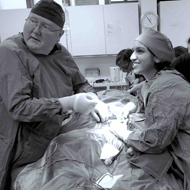
Bristol Zoo teams up with medics for rare procedure
A baby gorilla has been born by emergency caesarian section at Bristol Zoo after its mother developed potentially life-threatening pre-eclampsia.
The young animal was delivered by Professor David Cahill, a gynaecologist at St Michael's Hospital, who worked alongside his colleague Dr Aamna Ali and zoo vet Rowena Killick.
Worldwide, only a handful of c-sections have been performed on gorillas and it was a first for Bristol. The baby's mother, Kera, showed signs of ill health late in her pregnancy and after assessing her condition, the zoo's in-house vets sought help from medical colleagues.
Rowena Killick provided emergency resuscitation when the baby was delivered and the team are now "cautiously optimistic" about the new arrival.
For more details of the partnership between Bristol Zoo and St Michael's hospital, log in to read Vets and medics team up for rare c-section: http://vetcommunity.com/vs/vets-and-medics-team-up-for-rare-c-section/
Image courtesy of Bristol Zoo



 With Strangles Awareness Week just around the corner (5-11 May), vets are being encouraged to share a survey about the disease with their horse-owning clients.
With Strangles Awareness Week just around the corner (5-11 May), vets are being encouraged to share a survey about the disease with their horse-owning clients.